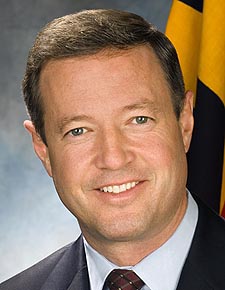
O’Malley Says Record Number of People Leaving Welfare for Work
Maryland Governor O’Malley today announced that a state record 12,504 people left welfare and found employment in the year ending September 30. More than one-third (37%) of these jobs pay $10/hour or more, and many former welfare recipients are working in key industries such as health care, warehousing, along with educational and administrative support.
O’Malley made the announcement during a visit to Johns Hopkins Hospital System (JHHS), the site of an innovative public-private partnership that trains welfare recipients for careers in the new economy.
“Over the last seven years, we have transitioned more than 75,000 individuals into jobs — individuals who would otherwise be dependent on the state for economic support,” said Governor O’Malley. “By linking a record number of parents with jobs, we are helping more moms and dads in Maryland obtain the skills they need to compete and better provide for their families.”
“There is no effective one-size-fits-all approach to job readiness. By focusing on the individual needs of our clients, we have been able to serve them better and help more clients achieve independence than ever before,” said Secretary Dallas.
Maryland has driven up Temporary Cash Assistance (TCA) job placements each of the last four years and 17 percent overall since September 2011, even as welfare rolls are shrinking. There are 26 percent fewer work-eligible TCA recipients today than there were in December 2010 at the height of the Great Recession. Top paying industries where TCA clients found work include:
• Health Care and Wellness: Jobs include caregivers, nursing assistants, patient transport, home health aides and pay an average wage of $9.80/hour, working 27 hours per week.
• Educational Support: Jobs include teacher’s aides and substitute teachers typically make $10.45 an hour and work 25 hours per week.
• Administrative Support: These positions are a key area of growth for TCA clients. Skills learned are highly transferable, including accounting, programming, data entry and other forms of office support. Workers typically earn $10/hour and work 30 hours/week.
An analysis of Maryland Temporary Cash Assistance outcome data by the Family Welfare Research and Training Group at the University of Maryland School of Social Work shows those who leave welfare and obtain a $10/hour job and work 30 hours a week are far less likely to return. Seven out of 10 TCA clients who leave with a job do not reapply for services within a year, and 60 percent never come back.
Governor O’Malley met with recent graduates of the Johns Hopkins General Services Internship Program, a partnership started this year between Johns Hopkins Hospital System, the Baltimore City Department of Social Services (BCDSS) and the Center for Urban Families (CFUF), a non-profit committed to helping Baltimoreans achieve stable employment, housing and family structures. Clients identified by BCDSS who successfully complete CFUF’s rigorous, month-long STRIVE employment training program are eligible to enroll in a five-month impact training/internship onsite at JHHS where they take classes and shadow workers. Of 48 participants so far, 31 successfully completed the impact training/internship, competed for jobs in their chosen field and are now employed at JHHS where they earn between $10.71 – $12.06/hour.
“I worked for 20 years in health care until I left my job to care for ailing relative. It was humbling turning to DSS for assistance making ends meet,” remarked Terron Tucker, 52, of Baltimore City, who now works on the Inpatient Unit with the Environmental Services team at Hopkins Hospital. “I’m so grateful. I’m employed now. This is the best gift I could have gotten this December.”
“Center for Urban Families is excited to partner with the Maryland Department of Human Resources and Johns Hopkins Hospital to provide essential job readiness skills as conveyed to us by employers,” added Joe Jones, president of CFUF. “It is our pleasure to provide customers of the Department of Social Services with the opportunity to successfully obtain jobs with real potential for advancement and access to additional education.”
“We are proud to be part of the partnership that puts East Baltimore and Maryland back to work,” said Johns Hopkins Hospital and Health System President Ron Peterson. “The General Services Internship Program is focused on helping launch careers, not just filling jobs.”
Employers interested in learning more about how they can partner with the Department of Human Resources should contact Adolphe Andou at adolphe.andou@maryland.gov. For more information about welfare use in Maryland, visit www.familywelfare.umaryland.edu.

Engage us on Facebook
Follow us on Twitter
Tweets by @mymcmedia